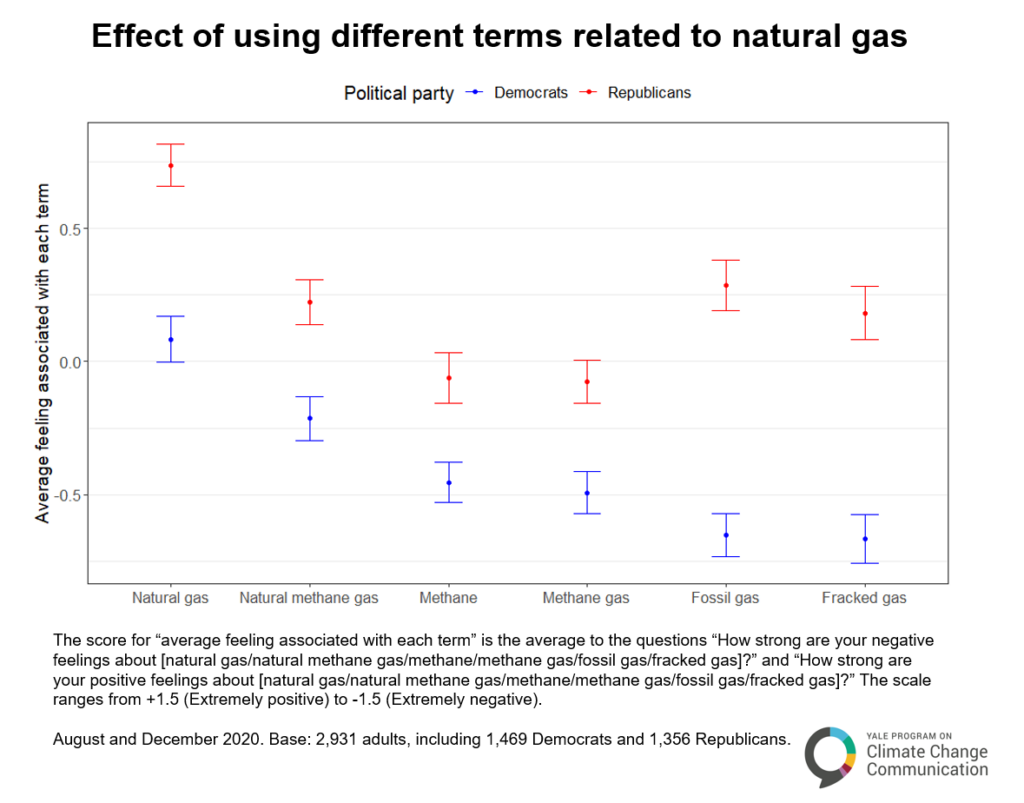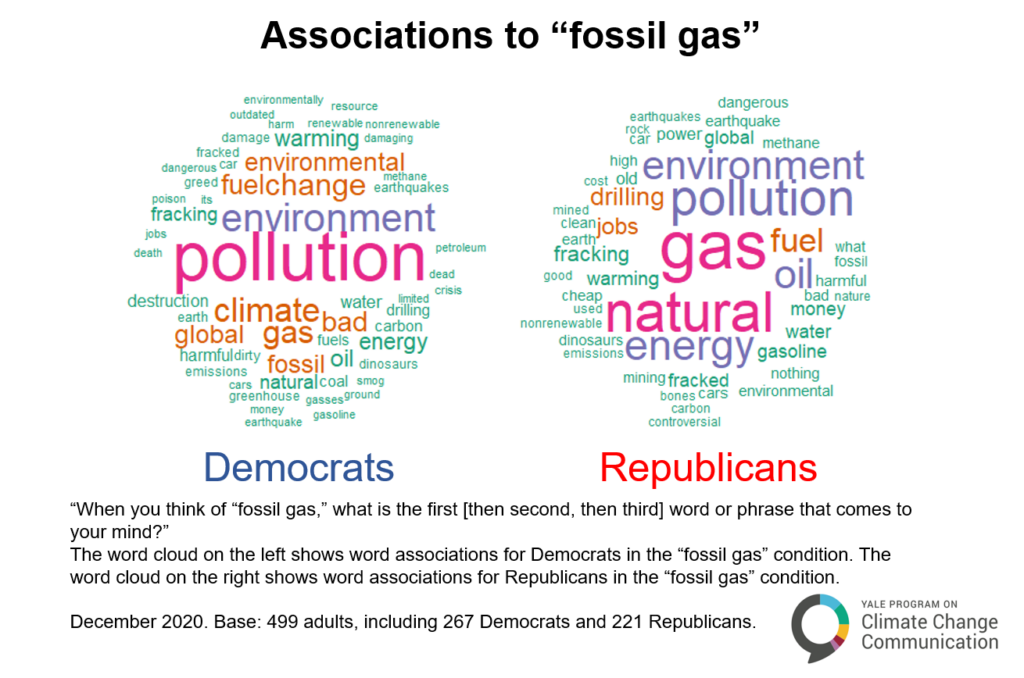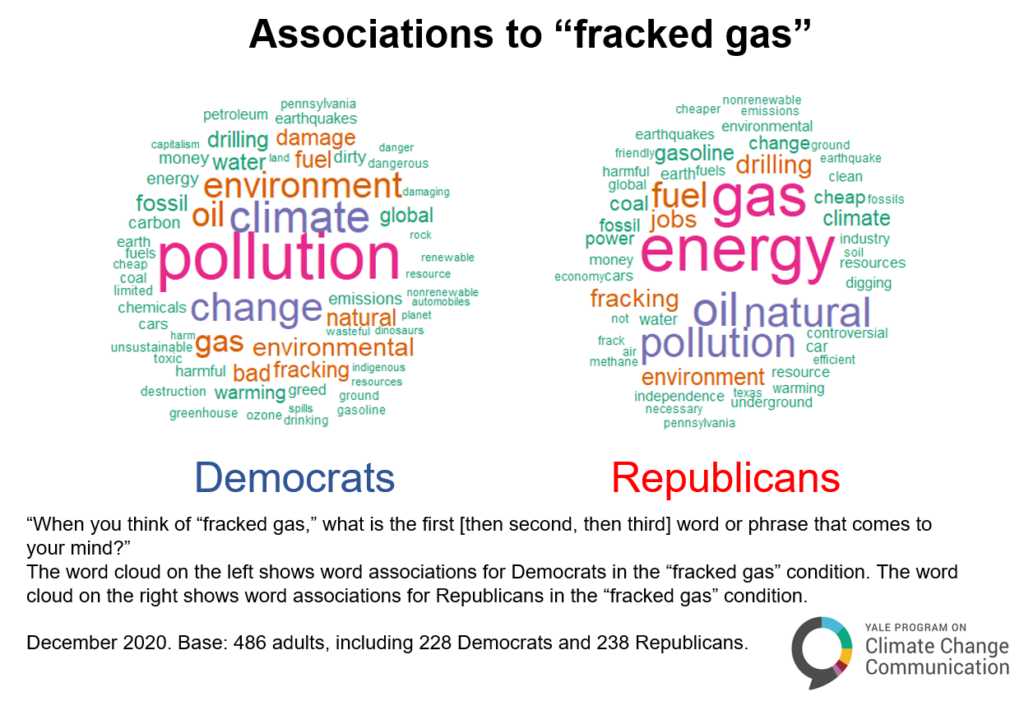Peer-Reviewed Article · Sep 9, 2021
Different names for “natural gas” influence public perception of it
By Karine Lacroix, Matthew Goldberg, Abel Gustafson, Seth Rosenthal and Anthony Leiserowitz
Filed under: Beliefs & Attitudes

Recently, we released results from an experiment in which we investigated how Republicans and Democrats respond to the terms “natural gas,” “natural methane gas,” “methane,” and “methane gas.” We found that both Democrats and Republicans had the most positive feelings about “natural gas” and the most negative feelings about “methane” and “methane gas.”
However, some scientists and advocates have used two other terms for natural gas: “fossil gas” and “fracked gas.” So we extended our original experiment to investigate the effects of these terms as well.
Unlike our first experiment (which found similar response patterns among Democrats and Republicans) our new study found that the two parties have widely divergent responses about “fossil gas” and “fracked gas.” Importantly, Republicans had more positive feelings about “fossil gas” and “fracked gas” than they did about “methane” or “methane gas.”
By contrast, Democrats had more negative feelings about “fossil gas” and “fracked gas” than “methane” or “methane gas.” In other words, these two terms (“fossil gas” and “fracked gas”) have polarizing, opposite effects. They are perceived slightly more negatively by Democrats than other terms, but are actually perceived as positive terms by Republicans.
Next, following the design of our first experiment, we asked respondents: “When you think of [fossil gas / fracked gas], what is the first [then second, then third] word or phrase that comes to your mind?” Each participant could provide up to three such associations.
As with the positive and negative feeling ratings above, this measure of associations also finds that the terms “fossil gas” and “fracked gas” are more politically polarized than “natural gas” and “methane gas” as described in our first study.
Although Democrats most often think of pollution when they see the words “fossil gas” and “fracked gas,” Republicans most often think of gas, energy, and the word natural.
Taken together, the findings from the two experiments indicate that both Democrats and Republicans have more positive feelings towards “natural gas” than “methane” or “methane gas.” However, the terms “fossil gas” and “fracked gas” produced larger partisan differences than any of the other terms we tested. Democrats felt slightly more negative, while Republicans felt much more positive about these two terms compared to the methane-related terms.
Overall, we find that the terms “methane” and “methane gas” are perceived as bad by both Democrats and Republicans. By contrast, the terms “fossil gas” and “fracked gas” have contradictory effects among Democrats (who perceive them as bad) and Republicans (who perceive them as good).
This line of research helps unpack the influence of the “terms of debate” used in public and political discourse. And importantly, it finds that the terms used sometimes have large differences in interpretation and meaning, both overall and among particular subgroups.
Strategically, campaigners seeking to reduce American reliance on this fossil fuel may find some additional value in using the terms “fossil gas” and “fracked gas” among Democrats, as Democrats (and perhaps advocates themselves) perceive these terms slightly more negatively than all the other names for this fossil fuel. However, using these same terms may actually be counterproductive with Republicans, who currently interpret these terms opposite to the way advocates intend.
The peer-reviewed article is available here to those with a subscription to the Journal of Environmental Psychology. If you would like to request a copy, please send an email to climatechange@yale.edu with the subject line: Request Natural Gas Paper.


